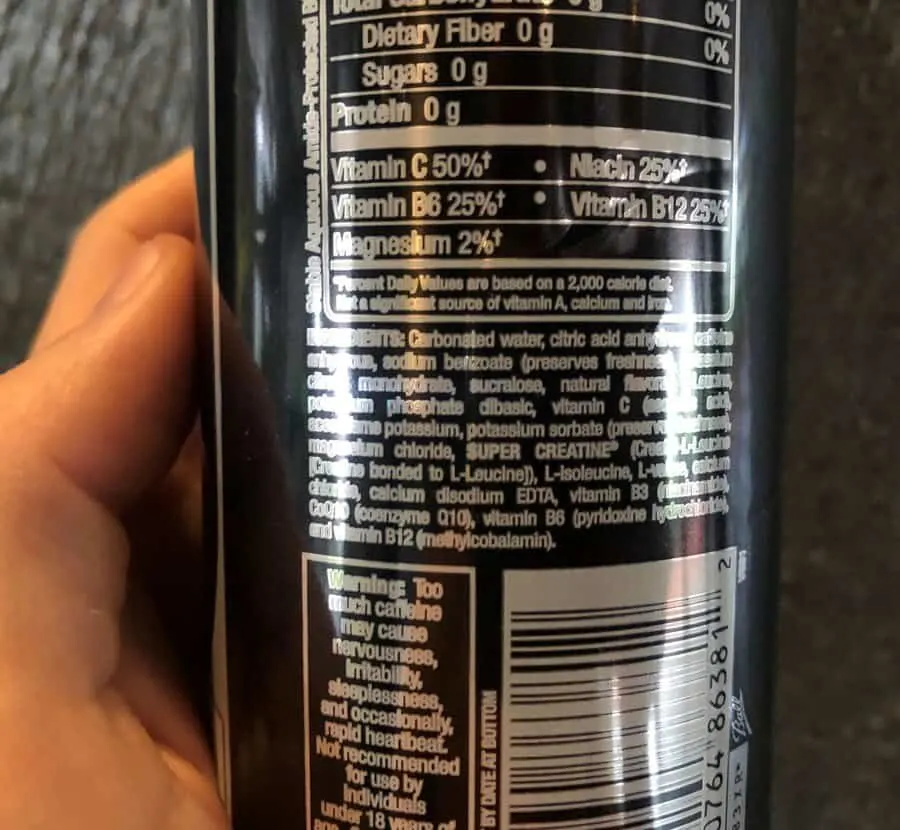You may be aware that there have been debates on the effects of energy drinks, from their wonderful benefits to the negative side effects.
Does that include all energy drinks? What about Bang?
Bang Energy may seem pretty healthy as it’s sugar-free and contains no calories but is that really the case? Does it automatically make Bang a healthy energy drink?
Here’s a quick answer: Bang Energy may be beneficial for the short term but it’s not a healthy option as it may lead to long-term health consequences.
If you’re curious to know how healthy your favorite Bang energy drink is, stick around for a detailed discussion on the inner workings of Bang.
Let’s start!
Contents
Bang Energy Drink Nutrition Facts
| Typical Values | Bang (16 fl.oz) | Monster (16 fl.oz) |
| Energy | 0 calories | 210 calories |
| Protein | 0g | 0g |
| Fat (Of which saturated) | 0g (0g) | 0g (0g) |
| Carbohydrate (Of which sugars) | 0g (0g) | 54g (54g) |
| Sodium | 40mg | 370mg |
| Caffeine | 300mg | 160mg |
| Vitamin B2 (Riboflavin) | – | 3.6mg |
| Vitamin B3 (Niacin) | 5mg | 46mg |
| Vitamin B6 | 0.5mg | 4.6mg |
| Vitamin B12 | 1.5μg | 13 µg |
| Vitamin C | 27mg | – |
| Magnesium | 5mg | – |
| Calcium | 5mg | – |
How much B12 is in a Bang?
There is no set amount of B12 in a Bang. A can of Bang, on the other hand, typically contains 10-30% of the recommended daily value of B12.
The main reason that Bang has B12 is that it is required for energy production. B12 aids in converting food into glucose, which the body then uses for energy. As a result, the main effect of Bang energy drink’s B12 content is that it provides energy to the body.
Bang Energy Drink Ingredients

A single 16 fl.oz can of Bang Energy contains:
- Carbonated water
- Citric acid anhydrous
- Natural flavors
- Malic acid
- Caffeine anhydrous
- Sodium Benzoate
- Potassium citrate monohydrate
- Sucralose
- Potassium phosphate dibasic
- EAAs (L-leucine, L-isoleucine, L-valine, L-lysine, L-threonine, L-phenylalanine, L-histidine, L-methionine, L-tryptophan)
- Potassium sorbate
- Magnesium chloride
- Vitamin C
- SUPER CREATINE® (Creatyl-L-Leucine)
- Calcium chloride
- Calcium disodium EDTA
- Vitamin B3 (niacinamide)
- CoQ10 (coenzyme Q10)
- Vitamin B6 (pyridoxine hydrochloride)
- Vitamin B12 (methylcobalamin)
How Much Caffeine Is In Bang Energy Drink?
Every 16 fl.oz can of Bang Energy drink has 300mg of caffeine which is quite a large amount, especially in a single serving.
Caffeine is beneficial in many ways, from making you more awake to improving your physical and mental performance. Caffeine can even help enhance your driving performance and reduce drowsy driving especially if you’re driving long-distance.
As a guideline, the FDA recommends a maximum daily caffeine limit of no more than 400mg for healthy adults. If you have more than that, you might end up with adverse effects like:
- Restlessness and shakiness
- Headache
- Insomnia
- Dizziness
- Dehydration
- Anxiety
Keep in mind that the intensity of these side effects is greatly influenced by your caffeine metabolism and tolerance to caffeine. If you aren’t used to consuming large amounts of caffeine in a short time, you should opt for energy drinks with lower caffeine content to avoid any of the unfavorable side effects.
Even if you’re a regular caffeine consumer, you still need to remember to consume Bang Energy in moderation. I suggest sticking to only one can of Bang per day and have it as an occasional drink instead of a daily one.

Does Bang Energy Contain Sugar?
Bang Energy doesn’t contain sugar, instead, it substitutes sugar with sucralose, a zero-calorie artificial sweetener. Sucralose functions to enhance the flavor of food and drink products.
It’s also 400 to 700 times sweeter than regular sugar and doesn’t have a bitter aftertaste as other sweeteners do.
One of the perks of artificial sweeteners like sucralose is that since it doesn’t have any calories, it’s an attractive alternative to sugar if you’re trying to lose weight or cut back on your calorie and sugar intake.
Another benefit to consuming sucralose-containing products is that it generally doesn’t raise blood sugar levels, so it’s suitable for diabetics to consume as well. However, if you do have diabetes, I suggest consulting your doctor first before having any sugar substitutes to be safe.
While sucralose might seem like a great sugar substitute, there’s still a lot that we don’t know about these sweeteners and their long-term effects. So it’s best to eat or drink anything containing sucralose including Bang in moderation.
For more info about sucralose and artificial sweeteners, check out this video:
Bang Energy Drink Vitamin And Mineral Content
According to Bang’s ingredient label, Bang Energy contains several types of minerals and vitamins. However, when compared to the recommended daily intake and tolerable daily intake level, it’s clear that the amount of vitamins and minerals in Bang is insufficient and won’t provide as many benefits to you.
Sure, you can still consume Bang, and they may benefit you, but you shouldn’t make Bang Energy your main source of vitamins and nutrients. The best source for that is a balanced diet or health supplements.
I’ve prepared an easy-to-read table on the vitamins and minerals found in Bang with their functions and daily intake limit below:
| Type of Vitamin/Mineral | Functions/Benefits | Tolerable Upper Intake Level (UL) | Bang’s amount |
| Magnesium | Regulates blood pressure; supports the immune system; boosts muscles and nerve system | 350mg | 5mg |
| Calcium | Maintains healthy bone and muscle function | 2000mg – 2500mg | 5mg |
| Vitamin B2 (Riboflavin) | Cell growth; energy production | – | – |
| Vitamin B3 (Niacin) | Converts nutrients to energy; repairs DNA; supports system as antioxidant | 35mg | 5mg |
| Vitamin B6 | Supports the central nervous system; ensures smooth metabolism | 100mg | 0.5mg |
| Vitamin B12 | Generates red blood cells; maintains brain function and nerve tissue health | – | 1.5μg |
| Vitamin C | Acts as an antioxidant; maintains bones, skin, and blood vessels | 2000mg | 27mg |
Is Bang Better For You Than Monster?
Bang is definitely better for you than Monster as Bang contains no sugar, no calories, and no carbs compared to Monster.
One of the primary concerns of consuming energy drinks is the amount of sugar and calories present in one can. With 54g of sugar, Monster far exceeds the AHA‘s recommended guideline of daily sugar intake which is 24g for women and 36g for men.
In my opinion, Bang is much better for your health than Monster as it spares you from dreadful sugar crashes and lowers the risk of health issues like weight gain and diabetes.
However, the other thing to look at is the caffeine present in Bang and Monster.
Bang has almost twice the caffeine Monster has, which may be a cause for concern if you have a low caffeine metabolism. If you’re not used to consuming large quantities of caffeine, you’re more likely to experience some nasty side effects.
So while Bang is healthier than Monster, if you consume Bang recklessly and don’t stick to the recommended guidelines, Bang will be harmful to your health as well.
Are Bang Energy Drinks Bad For Your Heart?

Bang Energy drinks can be bad for your heart if you don’t consume them in moderation.
Caffeine is the main ingredient in energy drinks that boost our energy levels and increase our alertness. However, this same ingredient can also trigger abrupt changes in heart rate and blood pressure, making it pretty harmful especially if you have heart disease.
According to this article, energy drinks like Bang can be bad for your heart as the caffeine within them could cause negative effects like heart palpitations, increased heart rate, and heart rhythm disturbances.
A 2016 study reported that you may be prone to heart rate issues and increase systolic blood pressure if you’re a regular consumer of energy drinks. This, in turn, increases the risk of heart attacks and stroke, especially for those who have multiple cans of energy drinks in a brief period of time.
A single 16 fl.oz can of Bang contains 300mg of caffeine, an amount that’s large enough to induce the aforementioned harmful effects on your heart, especially if you have a pre-existing medical condition.
It’s best to consult your doctor first if you’re unsure if energy drinks are something you can consume.
Do Bang energy drinks cause liver damage?
Scientific evidence does not support the claim that Bang energy drinks cause liver damage. However, energy drinks are not generally recommended for people who have liver problems.
Excessive consumption of any energy drink is also harmful to the body. Having said that, drinking Bang energy drink every day or in large quantities on a regular basis can lead to liver problems and other serious health risks.
Is Bang Energy Drink Banned?
Bang Energy drink isn’t banned anywhere else in the world EXCEPT in countries under the European Union.
According to this article, the Dutch court imposed the ban of sales and promotion of Bang Energy drinks in the European Union in 2019. This decision was made due to Bang’s misleading advertisements that deceived consumers.
Plus, the Court also highlighted the fact that ‘Super Creatine’, one of the ingredients in Bang Energy drinks, isn’t permitted in the E.U as it wasn’t approved for use in food products.
Thus, if you happen to live in countries like France, Italy, and Sweden, you may be unable to purchase Bang Energy from your local stores.
Is Bang Energy Drink Really Healthy?
Bang Energy drink can be healthy or unhealthy for you depending on your consumption.
First, let’s take a look at its benefits.
Bang Energy is calorie- and sugar-free, making it a healthier energy drink compared to sugary energy drink brands. Bang also has a high caffeine content that would boost your energy levels and improve your physical performance.
However, at the same time, Bang’s elevated caffeine content is also its downfall as it isn’t suitable for everyone. Bang isn’t recommended for you if you have a low tolerance to caffeine or if you’re new to energy drinks.
Another downside to Bang is that it has a number of ingredients that have questionable claims. It’s best to take these claims with a pinch of salt and not expect too much of them.
Ultimately, whether Bang is healthy for you or not boils down to how you consume it. If you stick to only a can of Bang per day and consume Bang in moderation, it’ll definitely benefit you in some way.
Though, I generally wouldn’t recommend having energy drinks regularly. Nothing beats a balanced diet and a healthy lifestyle after all.
Alternatives To Bang Energy Drink
Bang packs a punch, but some of us just can’t handle a lot of caffeine at a time. So, how about something that goes a little lighter on the caffeine? Here are some amazing energy drink alternatives:
- Red Bull
- Monster
- 3D Energy
- Celsius
- Game Fuel
- Full Throttle
- Advocare Spark (powdered)
- Mountain Dew Kickstart
- Bing
- Coca-Cola Energy
- Guru
- Zipfizz (powdered)
- Xyience
- Rockstar
- G Fuel (powdered)
Final Word
Personally, I don’t think that Bang Energy is the healthiest energy drink around, though it’s not the worst either when compared to other brands.
Despite the absence of calories, sugar, and carbs, Bang still contains a high caffeine content and several additional ingredients, including colorings, flavorings, and preservatives.
Bang’s elevated caffeine content could trigger severe adverse effects if you can’t handle large quantities of caffeine or have a medical condition.
That said, Bang is a tad ‘healthier’ than other sugar-containing energy drinks that are high in calories and carbs. With Bang, the main concern is the caffeine content, but as long as you stick to only a can of Bang per day, you’ll be fine.
I hope this article was helpful and informative, enjoy your day!
Check out the visual story version of this article here.
